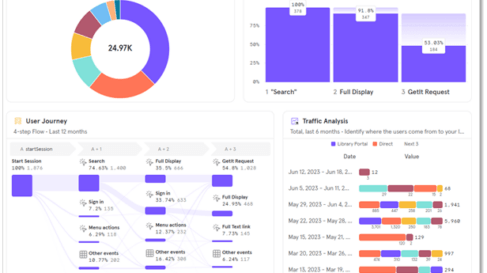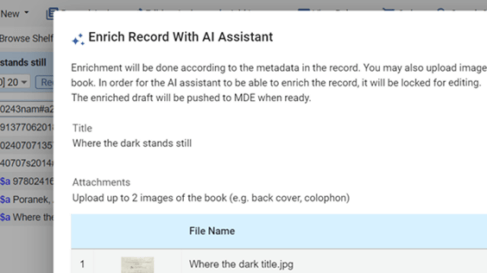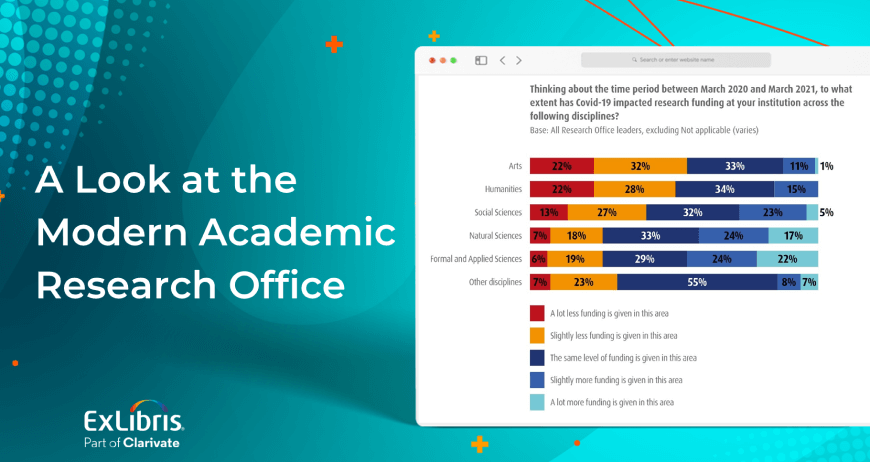Researchers in higher education are under constant pressure. They face complex funding challenges, increasingly robust compliance rules, new institutional demands, and technological advances. They must adapt to all these developments, make their work more accessible to colleagues, and demonstrate its reach to institutional decision-makers – while not short-changing the actual research and teaching they are doing.
Alterline, an independent research agency, was commissioned by Ex Libris to assess the experience of researchers and senior members of university research offices in conducting and supporting the production of research at institutions of higher education. The survey findings indicate several challenges faced by researchers in a landscape undergoing serious changes.
Too Much Stress, Too Little Time
“I am a little burned out and do not see the benefit of continuous research, just for the sake of surviving in academia.” — Faculty staff, Natural Sciences, United States
According to the feedback received in the survey, academic researchers face a significant challenge in finding enough time for all the activities necessary to both conduct and manage their research. Researchers describe feeling tension not only professionally – between research, teaching, and administrative responsibilities – but even in terms of an inability to maintain a work-life balance. Supporting this claim, members of the Ex Libris Research Advisory Council report that researchers at their institutions are investing around 45% of their time just in administrative tasks.
The research office and the library play key roles in a range of researchers’ tasks. Researchers report feeling supported by both the research office (81%) and the library (80%) at their institution.
So, how can we explain this apparent discrepancy between clear satisfaction with institutional support and reported feelings of too much stress and too little time?
Perhaps this discrepancy is because researchers undertake the majority of the tasks on their own, even in areas where the research office and library can clearly provide valuable expertise. Examples include the management of article processing charges (APC), which 47% of researchers handle on their own, depositing to institutional repositories (45%), finding funding opportunities (52%), preparing data management plans (54%), ensuring open-access compliance (55%), and monitoring research impact (61%).
Finding Research Grants & Funding
There is “constant pressure for funding money.” — Post-doctoral staff, Natural Sciences, Australia
Not only do over half of the researchers polled find funding opportunities without assistance from their research office, just over half of them also go through the application process for grants independently. According to the study, only 35% of researchers thought it was easy to find relevant funding opportunities and only 32% said it was easy to apply for them.
The study found that university research offices tend to prioritize support for larger grants or for academic “rock stars” who pulled in more funding in the past. Is it any wonder over four in ten academics reported difficulties in finding funding opportunities?
Demonstrating Impact
“When my research actually makes a difference, it is very satisfying.” — Post-doctoral fellow, Social Sciences, United Kingdom
According to the Alterline study, 86% of researchers said they are always or sometimes required to demonstrate the impact of their work.
Demonstrating the value of research projects is increasingly important for the reputation of the institution and the researcher, as well as for justifying future external and internal resource allocations. Yet, the best methods of meaningfully measuring it are still unclear. This is because the true impact is sometimes only evident over time and because isolating its effects can be a serious challenge.
Nonetheless, knowing how they have made a difference is what drives many researchers.
When asked what they enjoyed most about their role, researchers highlighted the application of their work in the real world. An analysis of the study suggests that providing information on the impact of research outside academia may have a positive effect on the retention of researchers by promoting feelings of greater engagement and fulfillment.
Showing Your Work: The Data
“There’s no point in doing something if you’re not excellent.” — Vice-Provost, United States
The quality of the research underway at universities is dependent on the resources available, the processes in place, and the scholars involved. However, gaining recognition of that quality takes a bit more effort.
Advances in technology have changed the demands for transparency in sharing research. The report revealed that most scholars (almost 60%) are now obligated to make their raw research datasets openly available with their published work. However, over a quarter of them (26%) find it difficult to do so in the context of current research data management solutions.
Showing Your Work: Researcher Profiles
A key part of showcasing research is keeping researcher profiles current, complete, and accessible. But there are significant challenges in doing so. Not least of these is that researcher profiles are scattered across many channels, led by LinkedIn (65%), the researcher’s university page (54%), and Google Scholar (42%). One in five researchers report using five or more profiles at the same time across a range of platforms.
Of the researchers surveyed, while 87% were aware of their institution’s researcher profile system, only 55% said they used it – a gap of a third who are not using such institutional systems. (It should be noted that the survey did not ask whether those who do use the institutional system actually keep their institutional profiles up to date.) The lack of use of institutional profile systems may be due to the various third-party platforms researchers use to publicize on their work, as well as their reported lack of time for what they see as an essentially administrative task.
Promoting a ‘Culture of Research’
In a report reviewing five years of progress in its strategic development, the University of Cape Town in South Africa stated that “support from the research office helped promote a culture of research at the university….”
That “culture of research” is another factor that influences the motivation and availability of resources for scholars who seek to invest their time and effort in research. In the coming blog entries, we will be delving deeper into the role of the research office and the library in meeting the challenges faced by researchers in the changing academic environment.
For more details, you can read the full Ex Libris study. Learn about the library software here.
Update, November 2021:
The Ex Libris 2021 research survey of 300+ researchers and 100+ research office leaders highlights their challenges during COVID-19. The report is freely accessible here.










